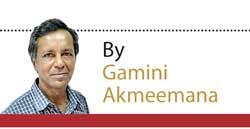Reply To:
Name - Reply Comment
Last Updated : 2024-04-18 08:56:00
The process by which a star is born is not visible to our naked eyes. But we know that this is not an overnight process. We only see the final product shining in the night sky.
Likewise, the birth of a good poet is a long drawn, arduous process not immediately apparent to outsiders. 
Anuradha Nilmini’s second book of verse, titled Ridum Piri Pirimedum (The Healing Carries The Hurt) signals the arrival of the biggest female poet writing in Sinhala after Monica Ruwan Pathirana.
Yugasthri, her first collection of poems published in 2011, showed a promising talent. Ridum Piri Pirimedum shows just how far she has come since then in the key elements of language.
Words are the building blocks of creative writing, and to write with feeling is hard enough. But when that feeling rests on an intricate, sometimes abstract and often exquisite arrangement of words, we know that the writer has mastered the art.
Though we didn’t get to see the birth process of this artistic supernova, we can be impressed by the result.
Born in Nikeweratiya, Kurunegala, Anuradha Nilmini started her writing career with children’s books and went on to become a journalist, writing for a popular tabloid for young women called Kumari.
Anuradha Nilmini is now at the height of her creative powers. If she doesn’t lose her way, she should leave an indelible mark on the pages of Sinhala letters and literature now in the making.
Her initial creative writing efforts were in novel writing, with several popular romances. But every creative writer must find a way to earn a living, and in this country, the most obvious choice is a newspaper.
 |
| Anuradha Nilmini - Pic by Kushan Pathiraja |
As such, she joined the Kumari editorial in 1994, following a stint as News Editor at TNL radio, Swarnavahini TV station, Sirasa FM and also as an investigative journalist for the Ravaya weekly till 2011. This was followed by two novels – Lali Keliya with abortion as its theme, in 2012, and Swarangpaliya in 2014.
In that year, her first book of poetry was published. However, her adolescent reading culture started not with the classics but with the short, gripping thrillers written by Deeman Ananda. But she was also fortunate enough to have a well-read neighbour who gave her a copy of the Rubayyat by Omar Khayyam (translated by G. B. Senanayake) to read.
Today, her favourite writers are American poet Maya Angelou (To whom a poem in this collection is dedicated), and Indian writers Maha Swetha Devi and Arundhati Roy. But her writing is her own, showing no obvious influences.
As Anuradha Nilmini puts it, she likes to study the ‘unknown, rather than the known,’ and, though her worldview has always been secular, she is now increasingly drawn to Buddhist philosophy for inspiration.
Some of her poems are drawn from that inspiration, but it is hard to compartmentalize this poet, to sum her up in a nutshell. Certainly, her gift with words results in the imagery of extraordinary vivacity and originality, giving extra depth and dimension to even the most ordinary situations. Though it’s very hard to translate her verse into English, I shall quote the following line from the poem Oya Ahenne, Kala Weva Iki Gahana Sadde (There, you can hear how Kala Weva weeps).
Another noteworthy feature is her talent for dramatic situations, whether drawn from history or today’s history in the making. Whether she is summing up King Dhatusena’s nature, or trying to understand how a terrorist’s mind works (in the poem about the Easter holiday bombings), this poet has a knack of viewing man’s dreams, aspirations and follies though the relentless passage of time.
“The distance between stars/counts as one day/all this water looks lovely when the big shots are gone.”
This is a typical example of the way the poet juxtaposes ideas and images – the stars, the water of the tank, those who held power, the politicians of the time (consider that something has been lost in translation). It’s hard to think of any other contemporary poet who can manage this feat with such consummate ease. In the poem ‘Those are heaps of cyber graves going up in flames,’ she writes:
“There’s a Vanik market in the middle of this cyber desert/and you think there might be gems there?/these top-heavy attics, leaning heavily with their empty superficial faces/while reeds bend over backwards as usual/and wild grasses flourish/there, smoke rises from those smouldering cyber graves.”
The problem again is with translation, as her line “bara vee, atuth bol sillara muhunu dama” doesn’t quite produce the same effect when translated as above. But the idea is clear enough, about how even those who should know better fall victim to cyber market forces.
While many of her poems are satirical, the poet sometimes writes with great tenderness; an example is the poem such as dedicated to the brigand Sardiel’s lover. These opening lines are a fine example of her rhyming.
“While cloaked in thick black on a Poya Day/Remember any sepalika flowers blooming anywhere?/’You’re my eyes’ you said, kissing me between my breasts/am I not your one and only refuge, like the hill of Utuwankanda?”
(Poyata porawala gananduru Kalu redda/sepalika kohewath pipilama nedda/’mata es dekai’ keewata simba lema medda/mang vitharai neda umbe utuwankanda).
Another interesting feature is her penchant for rhyming. With the advent of free verse, rhyming went out of fashion, though one can find short examples even in Mahagama Sekara.
Anuradha Nilmini revels in it. No major contemporary poet has used rhyme to this degree, and as effectively, either in Sinhala or English. It makes one listen again to the word music, very difficult to do with free verse. If we take an example from English poetry, T. S. Eliot had such an ear for word music and it comes across even in free verse, in works such as Wasteland. But rhymed poetry is really a throwback to the romantic era (Pushkin, Shelly, Keats, Victor Hugo), and our own ‘Colombo Poets’ epoch when P. B. Alwis Perera and Sagara Palansuriya mesmerised readers with their
word music.
Without going that far and working with more restraint, Anuradha Nilmini indulges herself and we are inevitably drawn into that indulgence. One can see that she really enjoys writing poetry.
Another noteworthy feature is her talent for dramatic situations, whether drawn from history or today’s history in the making. Whether she is summing up King Dhatusena’s nature, or trying to understand how a terrorist’s mind works (in the poem about the Easter holiday bombings), this poet has a knack of viewing man’s dreams, aspirations and follies though the relentless passage of time.
In the final analysis, though she may be writing about tragedy, her worldview is neither bleak nor tragic, and she is lavish with her emotions when she finds someone to admire, as one can see in ‘Fire Goddess,’ a poem dedicated to Lakshmi Agarwal who campaigned successfully to get legislation passed on behalf of acid attack victims in India.
Anuradha Nilmini is now at the height of her creative powers. If she doesn’t lose her way, she should leave an indelible mark on the pages of Sinhala letters and literature now in the making.

Add comment
Comments will be edited (grammar, spelling and slang) and authorized at the discretion of Daily Mirror online. The website also has the right not to publish selected comments.
Reply To:
Name - Reply Comment
On March 26, a couple arriving from Thailand was arrested with 88 live animal
According to villagers from Naula-Moragolla out of 105 families 80 can afford
Is the situation in Sri Lanka so grim that locals harbour hope that they coul
A recent post on social media revealed that three purple-faced langurs near t

10 Apr 2024
09 Apr 2024